Farmers’ demonstration in Saint-Etienne-de-Fontbellon, France © Wikicommons
Few could have missed the series of angry protests by European Farmers that have dogged the early months of the year. Many roads were blocked with stationary (or near-stationary) tractors and other agricultural vehicles in a display of anger and concern. Europe’s farmers, however quietly rural their normal lives may be, have never tur ned their back on showing European politicians just what they think of them. Not a lot, it seems. On the motorway from Paris to Brussels, the fed-up farmers daubed the words “Ursula, we are here”, just in case European Commission President Ursula von der Leyen failed to get the message. Fear not; she did. How could she possibly miss it? The tractor protest was aimed at encouraging the politicians to end the EU’s various free trade agreements with third countries; they’re demanding a lessening of bureaucracy as well as better process for their produce. The farmers (and farm workers) know their protests are unpopular with many ordinary citizens who have shown little interest in where the foodstuffs on their supermarket shelves come from nor just how much effort must be put into putting it there.
| HISTORY REPEATS ITSELF
We appear to be building up towards another “peasants’ revolt”, an event in 14th century England when peasants marched on London, led by Wat Tyler, supported by a preacher, John Ball, who is claimed to have said: “When Adam delved (dug, in modern English) and Eve span, who was then the gentleman?”.
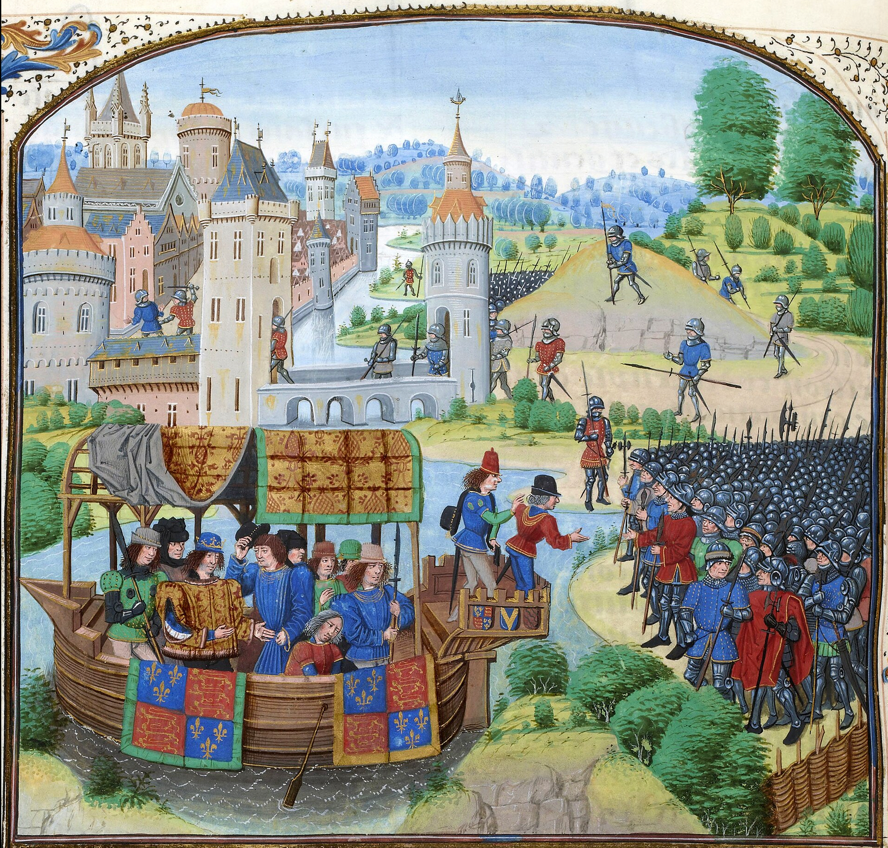
The King at the time, Richard II, had to shelter in the Tower of London, but he wanted to have both Tyler and Ball executed. At least that’s not a fate that threatens today’s protestors, although it provides proof that the uprising back then involved women as well as men, willing to suspend their spinning activities to get their message across. Ball’s much copied slogan, of course, made the valid point that it’s not the finely-dressed gentry who plant corn or dig up turnips or clear up the waste from cattle to use as fertilizer, but the simple sons (and daughters) of the soil. It still is. It’s a good slogan and I commend it to the protestors (with perhaps some minor updating adaptations)! Just to complete the story, back then, led by Tyler, the men of Kent killed some Flemish merchants (sorry, Belgium!) and burned down the palace of the King’s unpopular uncle, John of Gaunt, obliging the King to grant the protestors cheap land, trade that was free of taxes and restrictions, along with the abolition of serfdom and forced labour. Not a bad achievement, really, although London’s Chancellor, Archbishop Simon of Sudbury, and the Treasurer, Sir Robert Tales, were both blamed for the unpopular poll tax and subsequently murdered by the peasants.
Much of the protest today is also against the proliferation of regulations (it’s funny how history repeats itself) and all the many forms that must be filled in before the farmers can get their hands on their promised subsidies, to which they are entitled, of course. The fact is that all of us, however un-rural, need food and people with the skills (and physical strength) to grow it, tend it or milk it. We may all be in thrall to technology these days – and even depend upon it – but you can’t eat a computer. Now farmers from Spain, Italy, Greece and Poland have joined the party, demonstrating their support for the protestors’ cause. Indeed, the movement is still spreading. If you’re feeling bored sitting behind the wheel of a tractor, there’s nothing quite like a lively demonstration to raise your spirits. On the other hand, some of the protests appear to have links to Europe’s political parties of the far right, which is worrying some politicians.
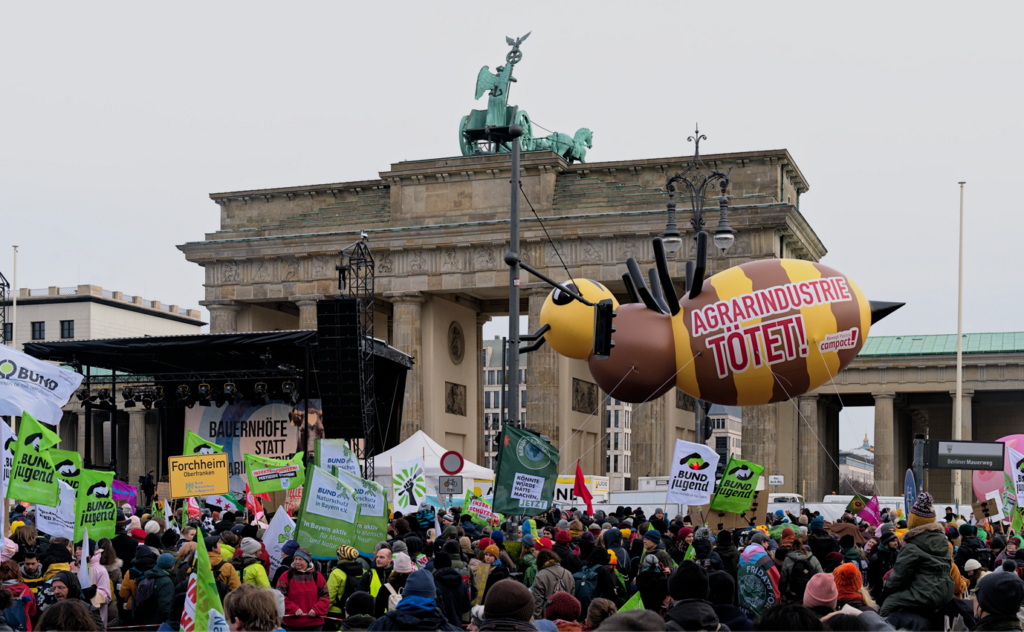
Much of the anger centres around Ukraine. Poland is, after all, just next door, and imports of cheap produce, subsidised to assist struggling Ukraine, are certainly harming Poland’s farmers. The produce includes cereals and milk products,. In one demonstration, their tractors bore the slogan: “EU Policy is Ruining Polish Farmers”. Another carried the words: “No farmers, no food, no future” or variations on that theme, and you have to admit they have a point. The farmers seem to be doing their best to spread the ruin far and wide, too, cutting down trees and burning them in some places, applauded by the more extreme Conservative politicians. They have even burned their own produce. Russia has made matters worse with its aggression interrupting trade flows. European Commission president Ursula von der Leyen has promised to cut down on bureaucracy, rather than trees, to allow the farmers to spend more of their time in their fields, instead of sitting at their desks or their kitchen tables, depending upon where they carry out their mountainous paperwork.
| DOING BAD BY DOING GOOD?
Leading politicians, at EU level and nationally, have announced a variety of measures aimed at addressing the problems the farmers face and lowering their anger. Britain’s “The Economist” magazine referred in a headline to “The pitchforks of discontent”, but so far levels of violence have been fairly low, apart from the occasional use of water canon to disperse the more riotous groups. Even so, when protests have got out of hand, the police have made arrests, albeit not many. The article makes it plain, however, that European farming is in decline, rather like the relevance of the EU itself, it says. There have been calls for calm, however, from such politicians as the Prime Minister of Belgium, Alexander De Croo. “Don’t demonise the farmers,” he warned, “Don’t send the army on them, but talk to them.”
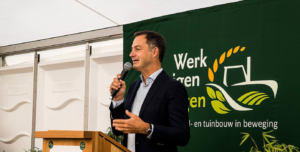
At EU level, politicians don’t want to close the doors completely to agricultural imports from, for instance, South American countries, but those imports must meet the standards that EU farmers must reach in order to sell their produce. Von der Leyen has already granted one major concession to the protestors: she has promised to scrap a plan to cut the use of pesticides by 50%. That should go some way towards appeasing the angry sons (and daughters) of the soil.
Europe’s farmers are also less than happy with existing and proposed environmental regulations, such as the requirement that 4% of farmland is supposed to be given over to biodiversity and protecting the landscape, which farmers say will affect them negatively. Meanwhile, the EU’s “Green Deal” will lead to a reduction in the use of chemicals and forms of production that may lead to green gas emissions. A number of environmental proposals have also been shelved or scrapped because of their feared impact on farming. Europe’s farmers have been coming under increasing pressure, admits European Commission vice-president, Maroš Šefčovič, a Slovak diplomat now responsible for pushing through the EU’s so-called “Green Deal” of environmental improvements, most of them unpopular with the farmers because it involves additional cost, more work and little or no reward. Who wants to spend more only to earn less?

And with European elections earmarked for June, no politician wants to upset too many voters. Šefčovič told MEPs during a plenary debate on agriculture that there is a need for a “future where farming and nature go hand in hand in balance.” That’s a great idea in theory but rather hard to achieve in the real world. Manfred Weber, head of the centre-right European People’s party group, said “we are in favour of protecting the environment, but together with farmers, not against them.” Of course, it’s not just the farmers and the politicians who are involved in this game; there is also large-scale industry whose only interest is in maximising profit. Green MEP Tilly Mets wants the European Commission to “launch an investigation into how powerful agri-food oligopolies impact farmers’ incomes and propose guidelines for an agri-food windfall tax.” That sounds like a good idea. The European farming organisations, COPA (Committee of Professional Agricultural Organisations) and COGECA (Comité général de la coopération agricole de l’Union européenne), said: “most of what was said was a political blame game, but not enough was said about solutions for the future of the sector.” Basically, far right politicians have hijacked the organisations to lobby (and more) against reforms. They’re rather like the American “anti-woke” groups who view any social or environmental conscience as being one step away from Marxism. However, they still want to see food on their supermarket shelves, even if their main interest is in seeing fat dividends for their share-holder friends. Anyone got a magic wand they’re not using at the moment?

The EU’s Common Agricultural Policy (CAP) for the period from 2023 to 2027 supports a gradual transition towards a more sustainable kind of farming and forestry in the Union. In other words growing what people need in a way that will allow you to do it again next year and the year after, and, indeed, indefinitely. It’s a laudable goal, of course, but achieving it is less simple. There is an old English saying about “killing the goose that lays the golden egg” – taking actions to reach a good end but unintentionally harming everything along the way and thus rendering the intended outcome unachievable. There’s been much talk about a “greener CAP” and the document specifies “no backsliding”; under the scheme payments to farmers would be linked to environmental and climate action so that no-one could have one without the other. For example, on every farm at least 3% of arable land must be dedicated to biodiversity and non-productive elements, with a possibility to receive support via eco-schemes to raise it to 7%. Wetlands and peatlands are also protected, and animal welfare measures are introduced. In fact, that, along with more organic farming and ecology measures takes up some 25% of the direct payments budget, while more than 35% of the budget for rural development is targeted at programmes supporting climate, biodiversity, the environment and also animal welfare again. Similarly, at least 15% of the budget for operational programmes for fruit and vegetables is for environmental issues. It all has to do with climate change, of course, although that’s not entirely down to the farmers. Scientists now believe that global temperatures are already 1.8 °C higher than in pre-industrial times. The finding comes from sea sponges in the Caribbean. There is also work going on to find out if sea creatures could eat more of the plastic in the ocean if it’s biodegradable. Making air traffic fly at lower altitudes could also reduce emissions, and it would not involve farmers. Scientists are now saying we should focus on net-zero emissions, rather than setting temperature limits. In fact, the rise in mean surface temperature is thought to be half a degree higher than accepted estimates already.
| MAKING POLITICIANS UNDERSTAND
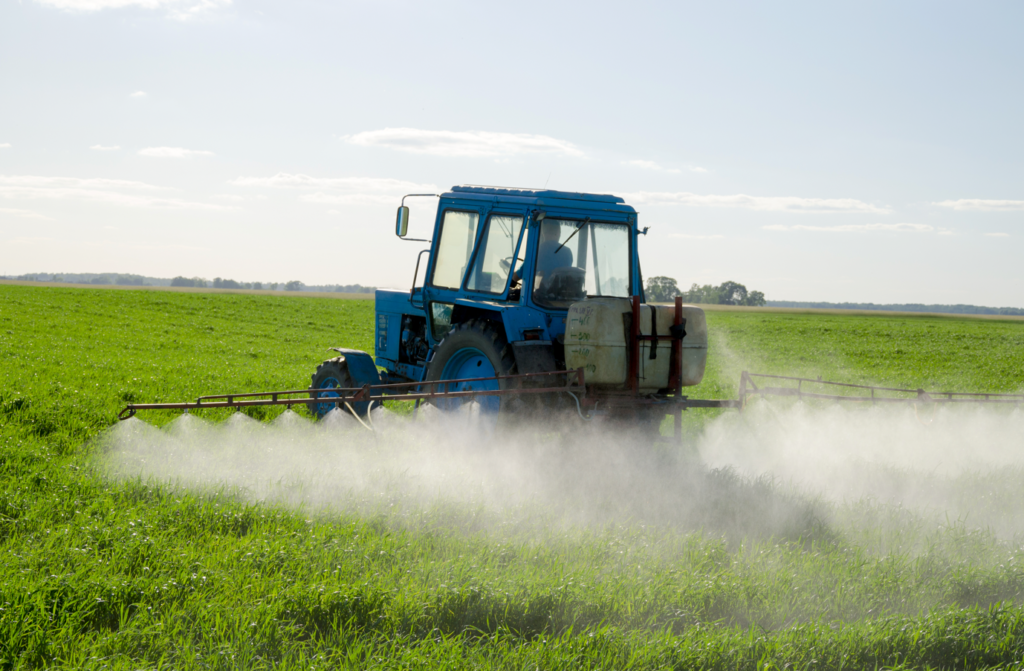
The people who work the land haven’t been forgotten, either. The proposed reforms include a redistribution of income support, with EU countries being obliged to dedicate at least 10% of their direct payments to what’s called the “redistributive income support” tool, thus helping the smaller and even medium-sized farms to meet their fiscal needs. The various reforms include improving working conditions for farm labourers. There is also an intention to encourage young farmers in the industry through income or investment support or start-up aid, and that includes aid for women in farming to encourage female participation in the industry. If you put all the EU’s intentions like that, it sounds wonderful. What’s not to like? Well, quite a lot, it seems. We should bear in mind that agriculture accounts for only 1.4% of the EU’s GDP, 4.2% of the EU’s employment, and 14.3% of the EU’s greenhouse gas emissions, but at the same time it receives around 30% of the EU’s budget.
For more than sixty years, European farming policies and subsidies have gone into the industrialisation of agriculture, with its consequent reliance on fossil fuels, chemical fertilizers and pesticides. What’s more, more than 80% of CAP subsidies are still going to just 20% of European farms, promoting large-scale industrial production and the concentration of land ownership in a small number of hands. Most ordinary Europeans don’t really understand what the demonstrations are all about: just what exactly do these farmers want? That’s not such an easy question to answer, but one French farmer demonstrating in Paris told CNN: “We are no longer making a living from our profession”. Fewer regulations restricting such convenient commodities as chemical fertilisers, chemical pesticides and simple, inexpensive ways to get rid of waste, of which agriculture produces large quantities. Like most people, they want cheaper ways to work and bigger profits at the end of it. Yes, the proposed reforms looked to be good for the land, the farm animals and cleaner air, but as COPA-COGECA pointed out: “Let’s not forget that this proposal was ideological from the outset, with no connection to the realities of agriculture, proposing unrealistic transitions without the necessary funding.” Most consumers support the overall aims of the farmers, but that doesn’t mean they will buy local produce that costs much more than imports, although they wouldn’t favour polluted air, lakes and rivers, either. It’s not that locally-grown produce isn’t available; it just costs more. Ever-higher energy costs and raised wages for farm workers have taken their toll as well, although no-one would dispute that agricultural workers deserve to earn more.

The far right have latched onto the protests by Europe’s fed-up farmers as a way to address various things they don’t like about today’s world. In America, a conservative movement decided to take a stand against what became known as “wokeness” – what they saw as too much emphasis on gender issues, sexuality and what was called “critical race theory”, which is defined in the Encyclopaedia Britannica as an intellectual and social movement based on the premise that race itself is not a natural, biologically grounded feature. It’s been scientifically proven not to define subgroups of human beings but is instead what it calls a “culturally invented category”, existing seemingly just to oppress and exploit people of colour. I’m sure most Americans believe that such arguments became obsolete with the end of the American Civil War. Sadly, it seems, a great many people still identify with the Confederacy that fought so hard to retain slavery. The Civil War Museum in Atlanta, Georgia, is a fascinating collection of Civil War-related objects but it makes no attempt to defend Confederate political thought about race and slavery. If you ever get to Atlanta I recommend a visit to the museum, which contains (among many other things) one of the original engines involved in what became known as “the Great Locomotive Chase” (the Walt Disney corporation made a movie about it) in which Union spies stole an up-to-date steam engine and tried to drive it to the North, although they failed.
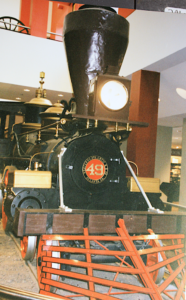
I followed the story in my childhood comic, The Eagle, and wanted the Union people to win, although the two spies were captured. The engine is a magnificent beast, however, and well worth a visit, even if “The Texas” was just one of several engines involved in the pursuit. In any case, whatever the anti-woke people believe, race has no genetic basis. Variations in appearance cannot be traced to different biological categories. We’re all just people, of whatever colour or appearance. The Confederates were simply wrong, as is slavery, of course. Whatever Europe’s farmers may be calling for and whatever COPA-COGEMA may say, it’s certainly not a return to that kind of racist, neo-Fascist, sexist, or anti-liberal thinking. Indeed, I’m sure that COPA-COGEMA don’t want that either.
| IS THERE A WAY FORWARD?
Of course, the farmers are not winning over many members of the public by blocking roads and burning things in the street and stopping non-farmers from getting to work or taking their children to school. It always happens with any sort of industrial action. Winning arguments by making lots of people angry and unsympathetic is never easy, and neither is it easy for politicians to pour oil on troubled waters and calm everything and everyone down. Poland’s Deputy Prime Minister WladysÅ‚aw Kosiniak-Kamysz, has called on the EU Agriculture Commissioner, Janusz Wojciechowski, to resign. He has come under fire from all sides. Although this now lengthy protest appears to have taken Europe’s politicians by surprise, they should have seen it coming; all the signs were there. Europe’s farmers are heavily burdened by debt, powerful retailers and their representatives have squeezed prices to the bone, as have the agrochemical companies, on top of which the farmers have suffered bad weather and competition from cheap foreign imports, made worse by Russia’s ongoing war in Ukraine.


With elections happening in many places this year, the farmers have timed their protest well: politicians who need votes can hardly ignore them. Much of the anger is over a proliferation of rules, mainly in aid of environmental concerns, that add to the farmers’ costs, their workload and their paperwork. Who wouldn’t protest? One farmer told reporters that EU leaders are “drowning them in legislation”. That’s why support for far-right and anti-EU politicians has been growing.
The fact is that Europe’s political leaders are under pressure to clean up the environment and improve animal welfare standards and the workers’ wage packets at the same time as trying to keep food prices affordable and Europe clean and healthy. They know that Europe generates almost 26 million tonnes of plastic waste each year, in addition to which around 80% of marine litter is plastic, and 87% of Europeans are worried about the impact plastic products are having on the environment. It’s a conundrum. EU leaders say they want to change the way in which plastic products are made, used and recycled, while trying to achieve a sustainable plastics economy, with safer production and consumption measures that also encourage innovation, competitiveness and jobs, not just in Europe but across the world. That’s why the EU is tightening up the rules on plastic bags, especially those lightweight ones given away in supermarkets only to be discarded later. The Commission also wants to tackle plastic packaging, in fact all kinds of packaging, cut back on single-use plastics and – if possible – reduce marine litter, in line with the aims of the United Nations Environment programme. That’s why the EU is very much in favour of the UN’s Global Partnership on Plastic Pollution and Marine Litter, an organisation set up in 2012. The problem is that such improvements cost money and at present it seems to be mainly the farmers who are paying for it. Improving the world is expensive, but EU leaders want to try, preferably without causing the farming community to drown in debt.

It’s a bit of a tall order and one that extremist politicians are racing to use, although there is no shortage of non-political organisations involved in various programmes, such as the International Maritime Organisation (IMO), which has pointed out that some experts are now predicting that by 2050 the quantity of plastics in our oceans could outweigh all the fish. Plastics kill marine life and take thousands of years to break down. Some scientists have estimated that we currently have some 171-trillion piece of plastic in our seas. That’s 171 followed by twelve noughts: 171,000,000,000,000, by the way. But we need to find a way to do that that doesn’t bankrupt our farmers. That’s why the European Commission has decided to delay a proposed regulation that would compel them to leave a certain proportion of their land to lie fallow, or non-productive. Meanwhile, the protest actions continue throughout the EU, releasing the farmers’ anger and frustrations but so far not coming up with a working solution. Perhaps there isn’t one. However, senior EU politicians are going to have to go on looking; they can’t afford not to. Otherwise, with or without Climate change, the farmers will make things too hot for them.

